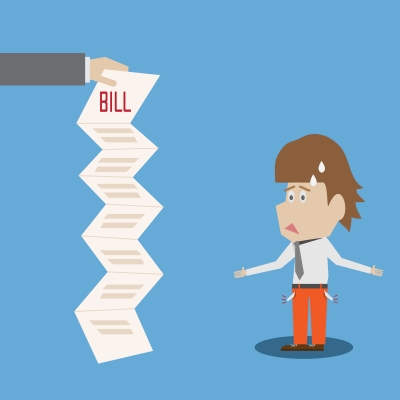Fine tuning your monthly budget is always a good thing. But how do you manage expenses that only happen once a year?
A Reader Question
I have read a few of your books and they have immediately opened my eyes to different ways we can help ourselves become more economical.
At the end of last year I started to look at budgeting our money so that we can pay off those pesky credit cards, loans, and other debt. My wife and I each have incomes that don’t fluctuate much so we can predict what each paycheck is going to be. I also have a side job that brings in extra money each week.
Our New Goal
My first goal for the New Year was to get rid of credit card debt. We’re off to a good start: we eliminated two in the first month and scheduled a third by next month.
Using QuickBooks I figured out what we earned and what we paid out last year, so I was also able to figure out what percent each expense was of the annual income. I looked at the expenses and grouped them together.
Then my thought was simply to use a spreadsheet to calculate how much each category was of the biweekly paycheck.
My Dilemma
Here is my dilemma: Originally when I first read your books I was just cutting my bills in half and was taking a little out of each paycheck and this worked great. But now I want to start saving money for future goals and those pesky annual bills and things like vacations, instead of scrambling at the last minute.
For instance, our Mortgage is $1568 (includes taxes, insurance, and principal). Half of that amount is $784, however, the percentage of the annual budget is $568.00.
Another example is Groceries. We have cut our bill down from $700 to $900 each month down to $600 per month for a family of four by eliminating our extra trips to the store.
That amount would be $300 per paycheck but based on the percentage of the budget it is $216.
My overall question is: What should I do?
- Cut all of the bills in half each per paycheck and then save what is left over for annual expenses?
- Or should I continue using the percentage of the annual budget and know that it will work itself out over time.
The Answer to Your Budget Question
Thanks for taking the time to pose such a specific question.
First off, you are doing great. Using any type of money management system on a consistent basis is going to help you make progress. The discipline is already paying off in eliminated credit card bills.
The “Percentage” versus “Halving” issue is a good question.
We wrote about this in our first book, America’s Cheapest Family in the utilities chapter:
“As with other budget categories, we save a pre-determined amount of money from each paycheck to cover our utility expenses. We have calculated our costs on an annual basis and divide the total by 24 to know how much to save each paycheck. (If you get paid every other week and reconcile your budget every two weeks, you’ll want to divide by 26). Because of our system and the mild Arizona winters, we always accumulate excess in our utility account as we head toward the summer — usually $500 to $700. This money will be slowly depleted by our higher summer utility costs.”
America’s Cheapest Family Gets You Right on the Money
Dialing in Your Budget Numbers
Basically, by fine-tuning your budget to match your paycheck cycles you can make your money go further as dividing by 26 results in a smaller amount going into each category with each paycheck. This actually frees up money to be used in other ways.
However, as I read your email, I see another issue, less obvious than the percentage versus half issue.
Dealing with Annual Bills
It appears that you don’t have budget categories for annual expenses like vacations, annual memberships (Amazon Prime, Costco, etc), or other “pesky annual bills.”
We handle those by creating a specific budget account for “VACATION” or “CAR REPLACEMENT” or “PESKY ANNUAL BILLS” and with each paycheck, we put a little money in those categories.
When the annual expense, or as in the case of car replacement, an expense that occurs every 5 or 7 years, occurs we have a good sum of cash saved for it.
Getting the Right Budgeting Program
The problem usually lies in your budgeting program. Does QuickBooks allow you to only track what you have spent, or could you set it up to accumulate cash in advance of expenses (like a vacation or car replacement)?
Our experience with Quicken was that when we didn’t spend the money we had “budgeted” each month on a particular category, for example, vacation, it showed the amount we had saved as a negative number
For example: If I set aside $100 in cash each month for vacation and put it in a jar, in month 3 I would have $300 saved in that jar. My budgeted amount was $100 per month, but I didn’t spend any of it so the amount grew.
If I did the same thing in Quicken, it showed that I was NEGATIVE $100 each month for a total of -$300 by the third month.
The only budgeting systems that we are aware of that allow you to accumulate cash in advance of expenses are EveryDollar, YNAB, and our America’s Cheapest Family Budget System.
We don’t use software, we use the old-fashioned paper and pencil method we described in our book.
Bottom line: Add those annual expense accounts to your budget. Manipulate your budget software to manage those new accounts (or use different software or method) and you’ll find yourself debt free, with money saved for the future.

